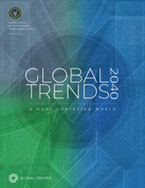 The National Intelligence Council – USA
The National Intelligence Council – USA
Overview: During the past year, the COVID-19 pandemic has reminded the world of its fragility and demonstrated the inherent risks of high levels of interdependence. in coming years and decades, the world will face more intense and cascading global challenges ranging from disease to climate change to the disruptions from new technologies and financial crises.
These challenges will repeatedly test the resilience and adaptability of communities, states, and the international system, often exceeding the capacity of existing systems and models. This looming disequilibrium between existing and future challenges and the ability of institutions and systems to respond is likely to grow and produce greater contestation at every level.
In this more contested world, communities are increasingly fractured as people seek security with like-minded groups based on established and newly prominent identities; states of all types and in all regions are struggling to meet the needs and expectations of more connected, more urban, and more empowered populations; and the international system is more competitive—shaped in part by challenges from a rising China—and at greater risk of conflict as states and nonstate actors exploit new sources of power and erode longstanding norms and institutions that have provided some stability in past decades. These dynamics are not fixed in perpetuity, however, and we envision a variety of plausible scenarios for the world of 2040—from a democratic renaissance to a transformation in global cooperation spurred by shared tragedy—depending on how these dynamics interact and human choices along the way.
